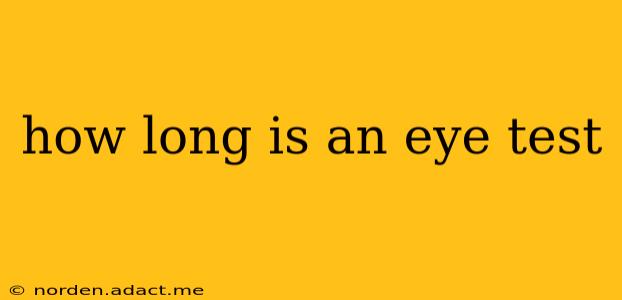How Long Is an Eye Test? A Comprehensive Guide
The length of an eye exam varies considerably depending on several factors. While a quick screening might take only 15 minutes, a comprehensive eye exam can easily extend to an hour or more. Understanding what to expect can help alleviate any anxiety and ensure you're prepared for your appointment.
What factors influence the duration of an eye exam?
Several factors contribute to the overall time investment required for a thorough eye examination:
-
The type of eye exam: A basic vision screening, often performed at a retail store or during a routine doctor's checkup, is significantly shorter than a comprehensive eye exam by an optometrist or ophthalmologist. A basic screening primarily focuses on your visual acuity (how well you see). A comprehensive exam, on the other hand, delves much deeper.
-
Your individual needs: If you have pre-existing eye conditions, like glaucoma, cataracts, or macular degeneration, your exam will require more time for detailed assessments and monitoring. Similarly, if you're experiencing specific vision problems, like blurry vision, double vision, or headaches, the doctor will need more time to investigate the cause.
-
The optometrist or ophthalmologist's approach: Each practitioner has their own style and approach. Some may be more thorough and meticulous, leading to longer appointment times.
-
Technological advancements: Modern technology used in eye exams, such as OCT (Optical Coherence Tomography) scans, can add to the overall time. These advanced imaging techniques allow for more detailed analysis of the eye's internal structures.
What happens during a comprehensive eye exam?
A comprehensive eye exam typically includes the following procedures:
- Visual acuity test: This classic eye chart test measures your sharpness of vision.
- Refraction test: This determines the power of lenses needed to correct your vision. This often involves using a phoropter, a device with various lenses to find the best prescription.
- Eye muscle tests: These evaluate the coordination and movement of your eye muscles.
- Pupil response test: This checks the reaction of your pupils to light.
- Intraocular pressure test (tonometry): This measures the pressure inside your eye, crucial for detecting glaucoma.
- External eye examination: The doctor examines the eyelids, conjunctiva (the membrane lining the inside of the eyelids), cornea, and other external structures for any abnormalities.
- Ophthalmoscopy: This uses an instrument called an ophthalmoscope to examine the retina, optic nerve, and blood vessels in the back of the eye.
- Other tests: Depending on your individual needs, additional tests like OCT scans, visual field tests (measuring your peripheral vision), or retinal photography may be performed.
How long is a routine eye exam?
A routine eye exam for someone with no significant vision problems usually lasts between 30 and 45 minutes. However, this can be shorter or longer depending on the factors mentioned above.
How long is an eye exam for children?
Eye exams for children may take slightly longer, especially younger children who may need more time and patience for the various tests. Expect the appointment to last between 45 minutes and an hour.
What if my eye exam takes longer than expected?
Don't be alarmed if your eye exam takes longer than you anticipated. It's often a sign that your doctor is being thorough and ensuring your eye health is properly assessed. It's always better to have a more thorough examination than to rush through the process.
In conclusion, the duration of an eye exam is highly variable. While a quick screening might suffice in certain cases, a comprehensive exam is necessary for optimal eye health and can take anywhere from 30 minutes to an hour or more. Always communicate any concerns you may have with your eye care professional.
